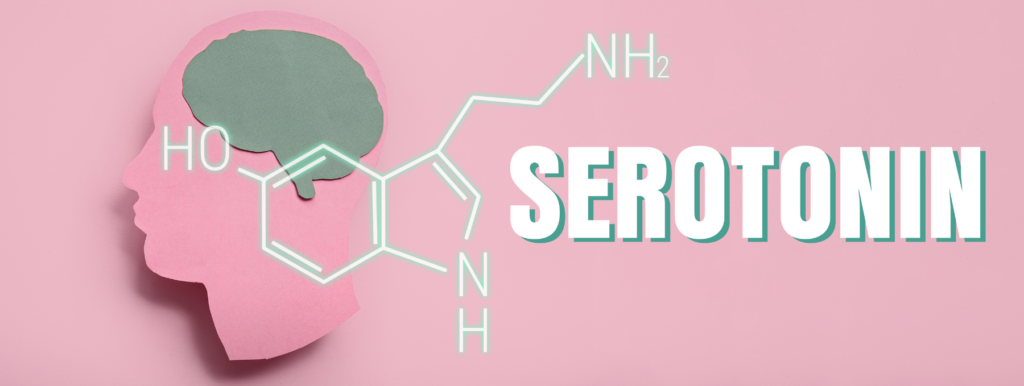Sleep is a vital component of human health that affects both physical and mental well-being. Among the various factors influencing sleep, neurotransmitters play a critical role. Serotonin, often termed the “feel-good” neurotransmitter, has been long recognized for its influence on mood, but its role in sleep should not be underestimated. Here we will explore the connection between serotonin and sleep by examining how serotonin affects sleep quality, the consequences of serotonin deficiency and potential treatments and lifestyle changes that can optimize serotonin levels for better sleep.
The Role of Serotonin in Sleep Regulation
Serotonin is a neurotransmitter that is primarily found in the brain, gut and blood platelets. Although most often associated with mood and mental health, only 10% of the body’s serotonin resides in the brain while as much as 90% of the body’s serotonin is located within the cells that line the gastrointestinal tract. Serotonin is synthesized from the amino acid tryptophan, which can be obtained from dietary sources such as turkey, nuts and cheese.
Serotonin influences various bodily functions, including mood, appetite, digestion and sleep. It helps to regulate sleep in multiple ways, including influencing melatonin production, supporting mood stability, regulating the different sleep stages and maintaining the body’s circadian rhythm.
Serotonin and Melatonin Production
 One of the key roles serotonin plays in relation to sleep is its function as a building block for melatonin, the hormone that regulates our sleep-wake cycles. When the sun sets and it gets dark outside, serotonin in the brain is converted into melatonin. This process signals that it’s time to wind down and prepare for sleep.
One of the key roles serotonin plays in relation to sleep is its function as a building block for melatonin, the hormone that regulates our sleep-wake cycles. When the sun sets and it gets dark outside, serotonin in the brain is converted into melatonin. This process signals that it’s time to wind down and prepare for sleep.
Higher levels of serotonin are directly linked to increased production of melatonin. This relationship shows how essential serotonin is for maintaining a regular sleep pattern. For instance, when people are exposed to bright light during the day, their serotonin levels often rise. This boost can lead to more melatonin being produced at night, allowing for a smoother and more consistent sleep onset.
The conversion of serotonin to melatonin takes place primarily in the pineal gland, a small gland in the brain. Low serotonin levels are directly linked to mood disorders, such as depression and anxiety, which can complicate sleep. When serotonin is deficient — often due to factors like poor diet, high stress or lack of sunlight—melatonin production can suffer. This, in turn, results in difficulties falling and staying asleep, which can further worsen mood issues. Understanding the strong connection between mood, exposure to light and sleep quality highlights the importance of maintaining healthy serotonin levels.
Serotonin, Mood Regulation and Sleep Quality
Serotonin is vital for mood regulation and emotional well-being. When levels are high, people tend to feel happier and more balanced, which creates a more conducive environment for restful sleep. A positive mood can reduce anxiety and racing thoughts, making it easier to relax and fall asleep. Conversely, serotonin deficiency can lead to mood disorders like anxiety and depression, which often disrupt sleep. For instance, anxiety may make it hard to quiet the mind, while depression can result in excessive sleepiness or insomnia, perpetuating a cycle of poor sleep and worsening mood.
Fluctuations in serotonin can also cause irritability and emotional instability, complicating sleep. Those with serotonin deficiency may experience mood swings and increased sensitivity to stress, which can lead to disturbances such as frequent awakenings. Research indicates that insufficient sleep can amplify feelings of anxiety and irritability, further lowering serotonin levels.
Maintaining balanced serotonin levels is crucial for both emotional health and quality sleep. Engaging in activities that boost serotonin—like regular exercise, spending time outdoors and following a healthy diet—can enhance both mood and sleep. Understanding the interconnections between mental health and sleep illuminates how focusing on one can significantly improve the other.
Serotonin’s Influence on Sleep Patterns
Sleep is composed of different stages — primarily REM (Rapid Eye Movement) and non-REM sleep – which are both essential for overall sleep quality. During non-REM sleep, particularly in deep sleep stages, important processes like physical healing and memory consolidation take place. Serotonin helps the body transition smoothly through the stages of non-REM sleep, ensuring that deep sleep provides restorative benefits, including the release of growth hormones for tissue repair. In REM sleep, characterized by vivid dreaming and heightened brain activity, serotonin also facilitates smooth transitions between cycles, enhancing emotional processing and cognitive functions like learning.
However, low or imbalanced serotonin levels can disrupt these sleep stages, resulting in fragmented sleep marked by frequent awakenings and difficulty reaching deeper sleep. The consequences can be significant: Poor-quality sleep may lead to daytime fatigue, trouble concentrating, and heightened emotional sensitivity. Inadequate REM sleep can impair memory and increase irritability, while insufficient deep sleep can leave you feeling unrefreshed even after getting enough hours of sleep.
Additionally, sleep disorders like sleep apnea are linked to serotonin regulation issues. The fragmentation caused by sleep disorders can further lower serotonin levels, creating a harmful cycle that exacerbates both mood and sleep problems. Recognizing serotonin’s role in regulating sleep patterns makes it evident that maintaining healthy serotonin levels is important for optimal sleep quality.
The Role of Serotonin in Circadian Rhythms and Sleep Cycles
Serotonin is essential for maintaining the body’s circadian rhythm; the internal clock that regulates sleep-wake cycles. This rhythm determines our alertness and sleepiness throughout the day, making serotonin crucial for maintaining a stable sleep schedule.
 Light exposure is key for serotonin production. Natural sunlight boosts serotonin levels during the day, enhancing alertness and energy. The suprachiasmatic nucleus (SCN) in the brain manages this process, aligning serotonin production with the light-dark cycle. As evening approaches, serotonin converts to melatonin, signaling the body to prepare for sleep.
Light exposure is key for serotonin production. Natural sunlight boosts serotonin levels during the day, enhancing alertness and energy. The suprachiasmatic nucleus (SCN) in the brain manages this process, aligning serotonin production with the light-dark cycle. As evening approaches, serotonin converts to melatonin, signaling the body to prepare for sleep.
Balanced serotonin levels typically result in consistent energy and restorative sleep. However, serotonin deficiency can lead to fatigue, daytime sleepiness and mood issues, creating a cycle that disrupts regular sleep schedules. Modern lifestyles can worsen these problems. Excessive screen time, irregular work hours and limited natural light can reduce serotonin production and inhibit melatonin release. These disruptions may cause sleep disorders like insomnia, particularly for those with erratic schedules, negatively impacting overall health.
Maintaining healthy serotonin levels is vital for well-being, as it stabilizes sleep patterns, boosts daytime energy, and promotes restorative sleep, contributing to better mental and physical health.
Serotonin and Sleep: The Consequences of Serotonin Deficiency
Serotonin deficiency can cause various sleep issues, with insomnia being one of the most common. Those with insomnia may struggle to fall asleep and stay asleep, often tossing and turning restlessly throughout the night. Serotonin deficiency can also result in frequent nighttime awakenings, which disrupts the sleep cycle and results in grogginess the next day. Even when sleep duration is adequate, low serotonin can lead to fragmented sleep and insufficient REM cycles, which negatively impacts cognitive function, mood and overall health.
Understanding the connection between sleep disorders and serotonin levels lends insight into conditions that disrupt sleep. For instance, depression and anxiety are often linked to low serotonin levels and can contribute to sleep disturbances. Those with depression may face insomnia, while individuals with anxiety may find it hard to relax and fall asleep. Seasonal Affective Disorder (SAD) also relates to serotonin fluctuations, as it causes depressive symptoms during seasons with reduced light, further lowering serotonin and affecting sleep quality.
Sleep apnea, a disorder characterized by interrupted breathing during sleep, is also linked to serotonin deficiency. Serotonin plays a critical role in regulating sleep-wake cycles and respiratory functions, and low levels may exacerbate the severity of apnea episodes. Additionally, Post-Traumatic Stress Disorder (PTSD) can disrupt serotonin production, leading to nightmares and insomnia. These connections emphasize the importance of maintaining healthy serotonin levels for improved sleep health and emotional resilience.
Improving Serotonin Levels: Natural Approaches for Better Sleep
Research shows that lifestyle changes—like getting natural light during the day, exercising regularly and practicing good sleep hygiene—can enhance serotonin levels and improve circadian rhythm regulation. Adopting habits that support serotonin production—such as regular exercise, eating a balanced diet and effective stress management—can greatly enhance overall sleep quality, as well as physical and emotional health.
Here are several lifestyle changes and dietary adjustments that can help:
1. Dietary Changes
- Incorporate Tryptophan-Rich Foods: Foods high in tryptophan are essential for serotonin production. Include turkey, eggs, cheese, nuts, salmon and oats in your diet.
- Complex Carbohydrates: Carbs can facilitate the absorption of tryptophan in the brain. Focus on whole grains, fruits and vegetables.
- Limit Processed Foods: Reducing sugar and processed foods can help maintain balanced serotonin levels.
- Limit Caffeine Intake: Caffeine can interfere with the ability to fall asleep and stay asleep. Try to limit its consumption, especially in the afternoon and evening hours.
- Be Cautious with Alcohol: While alcohol may initially make you feel drowsy, it often disrupts sleep cycles and can diminish sleep quality. Limiting alcohol intake can help promote better restorative sleep.
2. Regular Physical Activity
- Exercise: Physical activity can significantly enhance serotonin levels and improve mood. Aim for at least 30 minutes of moderate exercise most days of the week. Activities such as walking, jogging, cycling or swimming can help boost serotonin production, which in turn supports better sleep quality.
- Outdoor Activities: Engaging in outdoor exercise can also expose you to natural sunlight, which plays a crucial role in regulating serotonin levels. Sunlight helps stimulate serotonin production, so spending time outside, especially in the morning, can be particularly beneficial.
- Mind-Body Exercises: Activities such as yoga, tai chi and Pilates not only promote physical fitness but also enhance relaxation. These practices can reduce stress and anxiety, which are common barriers to good sleep.
3. Establish a Sleep Routine
- Consistency is Key: Going to bed and waking up at the same time each day can help regulate your body’s internal clock. Consistency reinforces your sleep-wake cycle, optimizing serotonin and melatonin production.
- Sleep Hygiene Practices: Creating a comfortable sleep environment is essential. Ensure your bedroom is dark, cool and quiet. Consider using blackout curtains, earplugs or a white noise machine to block out disturbances.
- Wind Down: Allocate time for relaxation before bed. Engage in calming activities such as reading, taking a warm bath or gentle stretching. Avoid screens, as the blue light emitted can interfere with melatonin production.
4. Manage Stress
- Mindfulness Techniques: Practices like meditation and deep breathing exercises can help reduce stress levels, which can otherwise deplete serotonin. Mindfulness helps ground you in the present moment and can improve emotional regulation, leading to better sleep.
- Limit Stressful Activities Before Sleep: Avoid intense discussions, work or stimulating activities in the hour leading up to bed. Creating a calming evening routine can signal to your brain that it’s time to wind down.
5.  Diet and Supplements
Diet and Supplements
- Tryptophan: This essential amino acid serves as a building block for serotonin and is found in various foods such as turkey, nuts, seeds and dairy products. Consuming tryptophan-rich foods can help boost serotonin levels naturally, promoting better mood and sleep quality. However, it’s crucial to combine tryptophan with carbohydrates for optimal absorption, so consider pairing these foods with whole grains or fruits.
- 5-HTP (5-Hydroxytryptophan): This supplement acts as a direct precursor to serotonin. It may help enhance serotonin levels, potentially aiding sleep. As with any supplement, it is advisable to consult a healthcare provider before starting 5-HTP to ensure it is appropriate for your individual circumstances.
- Melatonin: While not a serotonin booster, melatonin supplements can help regulate sleep patterns, especially in cases of insomnia or jet lag. It is important to approach melatonin use with caution and under professional guidance to ensure safe and effective usage.
Incorporating these supplements can help support serotonin levels and improve sleep quality but always consult a healthcare professional before starting any new regimen.
If you continue to experience sleep disturbances despite making lifestyle changes, it might be beneficial to consult a healthcare provider. They can evaluate for underlying conditions that may affect serotonin levels and sleep, such as depression, anxiety disorders and sleep disorders like sleep apnea or restless leg syndrome.
Serotonin for Better Sleep and Well-Being
The intricate connection between serotonin and sleep illustrates the importance of maintaining balanced serotonin for optimal health. Low serotonin can lead to difficulties falling asleep, frequent awakenings and overall poor sleep quality, contributing to a cycle of fatigue and mood disturbances. By adopting lifestyle changes that enhance serotonin production—such as dietary adjustments, regular physical activity, stress management and establishing a sleep routine—you can improve both serotonin levels, sleep quality and emotional and mental well-being to ultimately lead a more fulfilling life.




